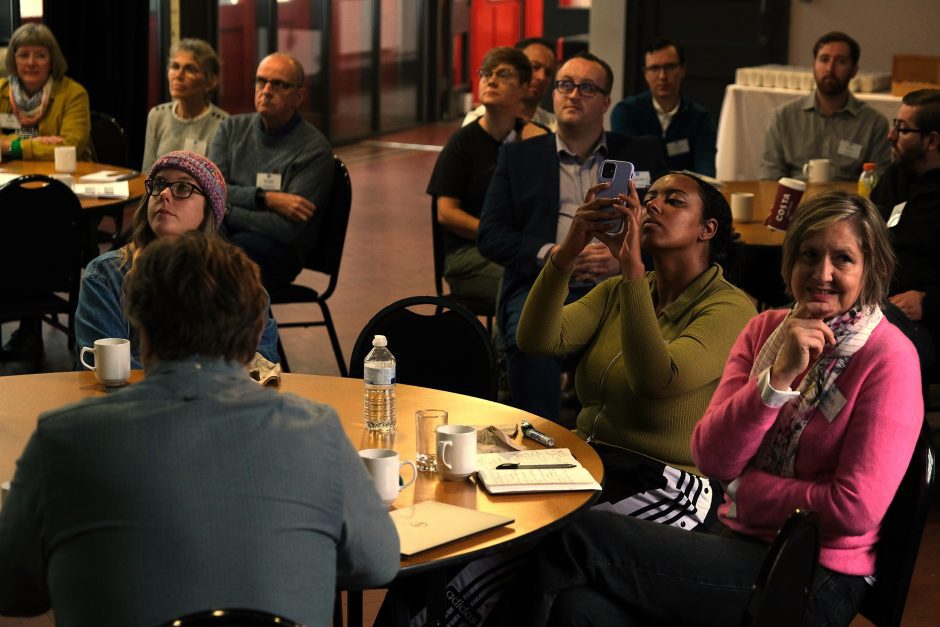A diverse mix of news publishers gathered in Bristol on 21 October for the 2023 Independent News Forum. Organised by the Public Interest News Foundation (PINF), the event provided a space to network, share knowledge and problem solve around the challenges and opportunities facing the industry.
PINF was established in 2019 to promote citizenship in communities across the country by supporting the provision of public interest news. The charity emphasises the role of independent publishers, which it defines as those with turnover below £2m and which are independent of political or commercial interests, as a key part of this work.
Engaging in capacity building, research and advocacy, PINF aims to ensure the sustainability of independent publishers of public interest news in communities that have been underserved by larger, commercial publishers.
A key part of the day was to encourage independent publishers to build relationships across the network. Jaldeep Katwala, PINF’s network manager, shared the work that has been done so far towards this aim.
PINF currently hosts an active Whatsapp group with around 64 members, averaging around 100 posts per week. Alongside this online activity, the charity has recruited a group of regional organisers to grow a community of indie publishers. They have so far engaged with over 200 publishers across the UK around its advocacy work, most notably its News for All campaign.
Related: Co-ops and the commons: imagining a ‘People’s Media’
The News for All Campaign centres around three main recommendations:
- Create a £100m Innovation Fund to kick start and build the capacity of truly local news providers, helping them find sustainable business models
- Create tax incentives to help truly local news providers raise donations and investment
- Make sure that truly local news providers get a priority share of revenue and data from the tech giants through the forthcoming Digital Competition Bill and the newly established Digital Markets Unit.

As a result of the 2022 Independent News Forum, PINF also produced a community engagement guide for independent publishers. The resource aims to help organisations understand different types of engagement, reflect on the work they are doing and could do more of, and learn from case studies around the world that could be adapted for individual publishers’ working with their communities.
The guide was trialled with a group of independent news publishers through a series of online sessions, who shared feedback on the process at this year’s Independent News Forum.
Another resource shared at the event focused on AI and its use in journalism. While AI tools have been used in newsrooms for a number of years, the technology has gained widespread attention with the launch of large language models such as Chat-GPT, which have the capability of producing news articles resembling those produced by humans. These are trained on vast quantities of text data, including original journalism produced by humans.
A September 2023 report from the JournalismAI initiative found that more than three quarters of media organisations surveyed are already using AI in at least one of the areas of newsgathering, production and distribution.
Some of the most common applications of AI in journalism include the automation of interview transcription, fact-checking, producing article summaries, proofreading, and scheduling and optimising social media content.
But the tech also comes with risks, such as issues with accuracy and misinformation, the exploitation of workers used to train the systems, perpetuation of bias, and copyright infringement.
Attendees of the news forum engaged in a discussion around the implications of AI for public interest journalism, including the need for education and accountability around the discipline, which is more than any single tool.
The afternoon’s conversations were decided by attendees through a series of open space sessions, revealing some of the most pressing concerns for those in the room. Topics of discussion included:
- What’s the secret formula for fundraising?
- Is print media dead?
- How can we incubate start-ups in news deserts?
- How can we share knowledge across the sector?
- How can independent news providers hold local government to account?
- What are the pros and cons of charitable status for newsrooms?
- Should we save local news or build something better?
- What is civic media?
- How can we recruit and train journalists?
- Is there potential for all UK indies to join under one banner to leverage advertising?
- What are your general election plans?
- What value are you adding to your communities?
- How do people deal with critical backlash to content?
The co-op force was strong in the room, with representatives from a number of co-operative media organisations present at the forum, such as the Independent Media Association, a member-owned co-operative that represents over 80 independent media publishers across the UK.
Worker co-op Research for Action was also there and shared useful resources to support media organisations scrutinise local government.
As well as Co-op News, other media co-ops in attendance included community benefit societies such as the Exeter Observer, the Manchester Meteor, and event hosts Bristol Cable.
Also in attendance was the Great Central Gazette, a new co-operative newspaper which launched in March this 2023 in Leicester.
A number of community interest companies were also there, including Greater Govanhill Community Magazine, Lichfield Live, Social Spider and the HI Hub, run by Histon & Impington Communications CIC.
Judging from the number of co-ops present at the 2023 Independent News Forum, there appears to be much overlap when it comes to the interests and values of public interest news and co-operativism, with both seeking to enhance democracy and accountability for the communities they serve. As the network of independent publishers grows and strengthens with the help of organisations such as PINF, co-op models look set to be a key part of the indie news ecosystem.